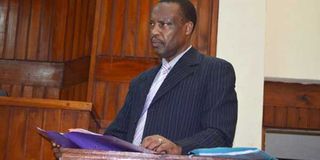British tycoon died of pesticide poisoning, pathologist Moses Njue tells inquest

Former chief government pathologist Moses Njue testifies in a Mombasa court on November 29, 2016 in an inquest into the death of British tycoon Harry Roy Veevers, who died mysteriously in 2013. Dr Njue said the man died of pesticide poisoning. PHOTO | KEVIN ODIT | NATION MEDIA GROUP
What you need to know:
- Dr Njue termed the report from a chemist in the United Kingdom as contradictory and general.
- He added that the doctor’s findings were not specific and further tests were needed so as to make it complete.
- He also dismissed a similar report by a Kenyan doctor which said the man died of an illness.
- Dr Njue was contracted as a private pathologist by the deceased’s two sons, Richard John and Philip Veevers.
Former chief government pathologist Moses Njue has dismissed a report that says a British tycoon, Harry Veevers, died of an illness or as a result of a brain injury.
Dr Njue, who told an inquest in Mombasa that the man died of pesticide poisoning, termed the report from a chemist in the United Kingdom as contradictory and general, and that it simply represented an opinion with no factual backing.
“The report lacked objective analysis. Anyone of my professional status would point to the existing gaps in the report. The report raises questions of skills, knowledge and competence of those who prepared them,” Dr Njue told Mombasa Chief Magistrate Douglas Ogoti during cross-examination.
He also dismissed a similar report that had been prepared by a Kenyan medical practitioner, Dr Salim Omar, which had told the deceased’s family that their father had died of an illness.
“There is a standard way in which data of specimen are analysed and the report presented in a professional way. But what has been produced before this court is below standard, a big joke that should not be accepted in a court of law,” he added.
He said one of the doctors who was involved in the matter had been fined Sh100,000 by the Kenya Medical Practitioners and Dentists Board for misconduct.
HEAD INJURIES
The report prepared by Dr Allan Richard had indicated that the deceased had at one point been involved in an accident and sustained head injuries.
The report also said the man had hypertension and that his sex life had deteriorated to a point where he was unable to achieve an erection.
The level of the severity of the disease was not specified.
“This could have increased the chances of the man committing suicide or thinking of killing himself,” William Mogaka said.
Mr Mogaka is representing the deceased’s widow, Azra Parvenu Din, and his two daughters, Alexandra Azra Veevers and Helen Azra Veevers, who are accused of conspiracy to kill their father.
Dr Njue said some of the findings by Dr Allan were true except that his conclusions were contradictory and hence damaged the whole report.
He added that the doctor’s findings were not specific and further tests were needed so as to make it complete.
“A report should be prepared in [such] a way that when it is subjected to a parallel subsequent forensic analysis, the findings and conclusion should be fairly similar,” he affirmed.
He said according to Dr Allan’s findings, the chemical that was noticed in the deceased stomach was not toxic and could not cause death.
Dr Njue disagreed with the findings, saying they had some issues that needed to be addressed.
FATALITIES
“The chemical in question has caused a lot of fatalities. So far we have 10 cases where the chemical, cyhalothrin, has been reported to have killed people. Mr Harry could be the 11th victim,” he said.
He also dismissed a report that the deceased had suicidal tendencies and that this could have played a part in his untimely death.
“Despite being rich, the man had a gun. He could have shot himself or jumped from a high building as most men do. It is not possible that he poisoned himself. Oftentimes, only women poison themselves and leave a suicide note,” he said.
While accepting that it might have taken a long time before the autopsy was conducted on the deceased’s body, he said this could not have greatly affected the outcome of the results.
He also acknowledged that it was possible that the manner in which the specimen had been stored could have affected the outcome of the autopsy results since their potency could have been interfered with.
Dr Njue was contracted as a private pathologist by the deceased’s two sons, Richard John and Philip Veevers.




